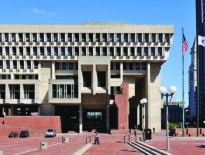Damien Chaviano
Principal, Mark Development
Age: 39
Industry experience: 16 years
Damien Chaviano is pushing one of Newton’s largest-scale development proposals toward the finish line after a contentious, three-year debate. In January, city councilors unanimously approved a zoning amendment that clears the way for Wellesley-based Mark Development to build over 1 million square feet of commercial and multifamily space next the MBTA’s Riverside station. Prior to joining Mark Development, the Newton resident worked at Boston-based Samuels & Assoc. on some of its biggest projects in the Fenway neighborhood.
Q: What was the key to getting buy-in from the neighborhood and elected officials for rezoning of the Riverside site in West Newton?
A: We stepped up in 2017 and took a controlling position from Normandy, who is still our partner in the project, and spent the better part of 12 months trying to unwind what happened. Permitting in Newton is no small feat. We thought we were walking into somewhat of a positive situation, given that Normandy had gotten 580,000 square feet approved.
In our minds, the idea of increasing density, given the starting point, wouldn’t be as controversial as we would soon find out. We had a number of neighborhood meetings and it was clear before we filed, we were going to have to have the direct highway access figured out. We turned all of our energies toward creating the preliminary design to put forth a plan to MassDOT and the Federal Highway Administration. We knew that was key.
The second piece, to our surprise, was the community members and councilors wanted commercial density here. The Lower Falls Improvement Association was dramatically concerned about the impact that commercial traffic would have on the area. We found ourselves last year in a protracted negotiation with the city and community groups. What we heard was a reduction of density, and a minimum 60 percent being residential. We reduced the density from 1.5 million to 1.025 million and agreed to a required ratio of no less than 60 percent residential. It spelled out every building by height. We were making an agreement that would preclude us from finding ourselves in a referendum. We were successful once we had those elements.
Q: Are you talking with architects about design changes in the wake of COVID-19?
A: We haven’t changed the design elements due to COVID. We made a strategic decision pre-COVID to convert our office space from conventional to more of a lab-life science format. In these times, I couldn’t feel better about that decision.
Q: Do you think suburban commercial demand will increase at the expense of downtown high-rise?
A: I’ll say this: we think suburban development has only become more attractive as it relates to COVID. In that type of dense environment, people are more in tune to their housing experience and it’s going to continue to push folks out of the city. We’re starting to get interest in a project we’re leasing up in Newton on Washington Street, Trio. We anticipated a lot of Newtonians who are empty-nesters, and I think that only is going to intensify for that reason. People want to stay local. But we’re also starting to see graduate students who are in school downtown, and young professionals who live downtown and are reverse commuting, who are starting to rethink that decision.
There’s going to be a lift in the suburban multifamily stock. On the commercial side, that was already starting to transpire. Rents in the lab life science space and lack of stock was pushing folks out of the city. This is going to further the hub-and-spoke model that’s being talked about.
Q: Did you consider condos rather than apartments for Riverside?
A: We looked at condos. Both [Mark Development CEO Robert Korff] and I live in Newton, and home ownership is something we can appreciate. We get asked that question by the City Council. The economics have not been able to support the costs to build on the condo model. The majority of the site is on an 85-year ground lease with the MBTA, so we were not comfortable building a condo association. For the buyer pool, it’s psychological. If this were New York City, there’s precedent where people understand in a lot of instances you don’t own the dirt underneath your building. In Boston, it’s very rare. To bring it into a market that hasn’t had signed ground lease deals is a hard sell.
Q: How vulnerable is the apartment market this year with the uncertainty about colleges’ plans for on-campus learning?
A: It’s going to be ugly. A lot of students who drive that downtown market are sitting waiting to hear what’s happening this fall and contemplating the comfort level being on public transit. It’s hard to imagine there’s not going to be a ripple effect. Rent growth is going to disappear for the next couple of years, but it’s going to put landlords in a preserve-and-protect mode, fighting for leases. There’s a lot of great product built in the last five years and neighborhoods to choose from now. Corporate users that have been a shadow market in Boston, that’s going to dry up. When you lose that clientele, it’s going to be a challenge.
Q: What were some of the highlights of your time at Samuels & Assoc.?
A: When I came on board I had just gotten out of graduate school during the 2008 crash. Steve was recasting Samuels and making a hard push from the retail lifestyle center developments and putting his chips in the Fenway. I worked on the Van Ness, the Pierce, the repositioning of the Landmark Center and acquisition of 132 Brookline Ave. The only non-Fenway project was Continuum in Allston. I got my Ph.D in development from Samuels & Assoc.
Q: Have you noticed an uptick in off-market transactions this year?
A: What’s happening now is a lot of off-market transactions right now are multigenerational real estate. People are starting to feel a little more stressed in the second and third generation about holding these assets and where the rental income is going to come from, so rather than worry about that headache, now might be the right time to joint venture or harvest the underlying value of the development. That’s only going to pick up until the real estate market stabilizes.
Chaviano’s Five Favorite Beers
- Hill Farmstead, Edward
- Upper Pass, First Drop
- Medusa, Light Runner
- Mighty Squirrel, Cloud Candy
- Ballast Point, Sculpin




 |
| 


